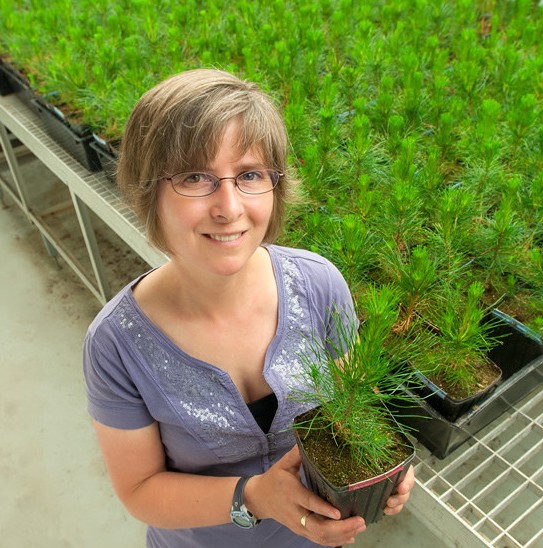 Janice Cooke Ph.D (Director)
Janice Cooke Ph.D (Director)
Associate Professor
University of Alberta
Janice Cooke is the Director of the TRIA Mountain Pine Beetle NSERC Strategic Network and an Associate Professor in the Department of Biological Sciences at the University of Alberta. Janice has worked in forest biology since 1989, receiving her training at the University of Victoria, University of Alberta, University of Florida, and Université Laval. The Cooke lab is investigating how forest trees respond to biotic and abiotic environmental cues, with the goal of identifying molecular and cellular processes that underlie these responses. In TRIA-Net, Janice’s group is investigating environmental and genetic factors that influence how pines respond to attack by mountain pine beetle and their fungal associates. The group uses a wide suite of experimental approaches that integrate genomic, molecular, biochemical, cellular and whole plant studies. Within TRIA-Net, Janice’s group collaborates with population geneticists, ecologists and modellers. Janice’s research group also participates in other large scale multidisciplinary genomics projects in forest trees.
Jörg Bohlmann Ph.D (Co-Director)
Professor
University of British Columbia
Jörg Bohlmann is a Professor and Distinguished University Scholar in the Michael Smith Laboratories at the University of British Columbia, Vancouver, Canada (www.michaelsmith.ubc.ca/faculty/bohlmann/). He received his PhD from the Technical University Braunschweig, Germany, was a postdoctoral fellow at Washington State University, USA, and research associate at the Max Planck Institute for Chemical Ecology, Germany. He holds appointments in the Department of Botany, the Department of Forest and Conservation Sciences, and is an Associate of the UBC Wine Research Centre. He is co-director of the UBC Genome Science and Technology graduate program. His research deals with plant secondary metabolism, conifer genomics, and plant defense against insects. He has published over 180 peer-reviewed publications and holds several patents. His research is funded by the Natural Sciences and Engineering Research Council of Canada (NSERC) and other sources. He has been project leader of five large-scale, Genome Canada-funded genomics projects. He has received national and international awards including a Feodor Lynen Fellowship of the Alexander von Humboldt Foundation, the C.D. Nelson Award of the Canadian Society of Plant Physiologists, the Charles A. McDowell Award for Excellence in Research awarded by UBC, and the NSERC E.W.R. Steacie Memorial Fellowship; he is an elected Fellow of the American Association for the Advancement of Science.
 Dave Coltman Ph.D
Dave Coltman Ph.D
Professor
University of Alberta
Dave Coltman works at the interface between ecology and genetics, where the tools of molecular biology (DNA sequencing, microsatellite and SNP genotyping) are used to address consequential questions in ecology and evolution. Dave and his students have worked on a wide range of wildlife species including marine mammals, mountain ungulates and many other species of conservation concern. In TRIA-Net, Dave is part of the team using population genomics to better understand the interactions between beetle, pine hosts and fungal associates. Dave also serves as a Senior Editor for the journal Molecular Ecology and as the Associate Dean (Research) for the Faculty of Science at the University of Alberta (http://www.biology.ualberta.ca/faculty/david_coltman/).
Nadir Erbilgin Ph.D
Associate Professor
University of Alberta
Nadir Erbilgin, a Canada Research Chair & Associate Professor at U of A, has developed an expertise in understanding plant defence mechanisms to insects and diseases in forest ecosystems and used the invasion of the jack pine forest by the mountain pine beetle as his study system. His lab (http://www.rr.ualberta.ca/StaffProfiles/AcademicStaff/Erbilgin.aspx) is specialized on terpenoids, esp. monoterpenes, phenolic compounds, fatty acids, and non-structural carbohydrates. He has investigated whether jack pine is suitable to mountain pine beetle as a host and focused on plant secondary compounds to assess plant susceptibility because they are recognized as fundamental to the defence of plants against biotic agents. He has extensively published on plant-insect-pathogen interactions, phytochemistry, and tree-mediated interactions between insects and diseases. Interactions within complex systems are a main theme of his research program, thus making him well suited to undertake studies focusing on jack pine-mountain pine interactions from a chemical ecology perspective. In particular, he is investigating how variation in growing conditions influences jack pine defence capacity, with inevitable consequences for mountain pine beetle productivity and profusion.
 Maya Evenden Ph.D
Maya Evenden Ph.D
Associate Professor
University of Alberta
Maya is broadly interested in the behavioural and chemical ecology of insects and how message-bearing chemicals (semiochemicals) can be exploited for pest management. She approaches this research from behavioural, physiological, ecological and evolutionary perspectives. Although this research is applicable to a wide range of organisms, for her study systems, she targets insect species considered to be pests in a variety of managed ecosystems. Research in her laboratory (http://www.biology.ualberta.ca/faculty/maya_evenden/) also examines factors that influence insect flight and whether energy dedicated to flight results in energetic trade-offs with subsequent reproduction. Using a flight mill assay, they have examined the effect of factors such as insect size, wing-loading, fat content, age and mating status on flight capacity in several important insect pests of forests, including the mountain pine beetle as part of the TRIA Network. Trade-offs between flight and reproduction occur in some species (mountain pine beetle) but not in others (large aspen tortrix). Information on the dispersal capacity of mountain pine beetle is being used in collaboration with other TRIA Network researchers to parameterize models to predict dispersal and range expansion of the mountain pine beetle.
Awards Received:
NSERC University Faculty Award: 2003-2008
Gordon Hewitt Award, Entomological Society of Canada-for outstanding contribution to Entomology by a researcher under age 40: 2007
 Cathy Cullingham Ph.D
Cathy Cullingham Ph.D
Research Associate
University of Alberta
Cathy first started with the TRIA project in 2010 as a postdoctoral fellow, and continues to be involved as a research associate. Her background is in population and landscape genetics, primarily in mammal systems. When she was given the opportunity to work on the genetics of lodgepole and jack pine to understand mountain pine beetle spread risk, how could she say no – they stay still! Her work has ranged from developing markers to discriminate the pure pine species from their hybrids, to identifying genetic loci that may be adaptive in nature. Highlights of her tenure on this project include an interview with Bob McDonald of “Quirks and Quarks”, being named Venture magazine’s 50 most influential Albertan’s of 2011, and more recently an interview with Willem Marx of Bloomberg TV to talk about the science side of the economic impacts of mountain pine beetle.
 Felix Sperling Ph.D
Felix Sperling Ph.D
Professor
University of Alberta
Felix Sperling is an entomology professor who has been a collaborator with the TRIA project since its inception. His work has dealt with the evolutionary biology and population genetics of both the mountain pine beetle and the blue stain fungi that the beetle carries. Current research in his lab is focused on understanding the genomic architecture of the beetle in relation to environmental factors and its dispersal capability.
http://www.biology.ualberta.ca/faculty/felix_sperling/
 Philippe Tanguay Ph.D
Philippe Tanguay Ph.D
Molecular Forest Pathologist
Laurentian Forestry Centre
Philippe Tanguay is a molecular forest pathologist at Natural Resources Canada (https://cfs.nrcan.gc.ca/employees/read/phtangua). His research interest lies in the biology and control of fungi responsible for tree diseases and wood biodegradation. He uses complementary approaches, including genomics, proteomics, functional genetics and microscopy to identify and characterize fungal pathogenicity factors involved in tree-microbes interactions. Philippe utilizes the results to design molecular markers for tree pathogen identification, monitoring and management of resistant host trees. In TRIA-Net, Philippe is studying the genetic factors contributing to the adaptation of Grosmannia clavigera, a mountain pine beetle fungal associate, to his host trees and beetle vector.
 Mark Lewis Ph.D
Mark Lewis Ph.D
Professor
University of Alberta
My research focus is mathematical biology, with a focus in spatial ecology. I am a Senior Canada Research Chair in Mathematical Biology and a Professor in the Departments of Mathematical and Statistical Sciences plus Biological Sciences at the University of Alberta.
http://www.biology.ualberta.ca/faculty/mark_lewis/
http://www.math.ualberta.ca/~mlewis/people/mlewis.htm
http://www.math.ualberta.ca/~mathbio/people/BioSketch/lewis.html
http://www.math.ualberta.ca/Lewis_M.html
 Richard Hamelin Ph.D
Richard Hamelin Ph.D
Professor
University of British Columbia
Senior Research Scientist, Natural Resources Canada
Dr. Richard Hamelin obtained a B. Sc. from McGill University in 1982, a Master’s of Pest Management from Simon Fraser University in 1986 and a Ph.D. from the University of Kentucky in 1990. He has 30 years of experience in forest health research and has published over 100 peer-reviewed scientific papers. His work aims at using genomics to design better detection and monitoring methods to prevent invasions of pests and pathogens that threaten forests. He was president of the Canadian Phytopathological Society and the Quebec Society for Plant Protection and was awarded the International Unions of Forest Research Organization Scientific Achievement Award (2014), the Queen Elizabeth II Diamond Jubilee award (2012), Merit Awards from Natural Resources Canada (2008), the Canadian Forest service (2008), the Canadian Food Inspection Agency (2007), and the Quebec Society for Plant Protection (2008) for his pioneering work on the application of genomics in forest protection.
http://profiles.forestry.ubc.ca/person/richard-hamelin/
https://cfs.nrcan.gc.ca/employees/read/rhamelin
 Dezene Huber Ph.D
Dezene Huber Ph.D
Professor
University of Northern British Colombia
Dezene Huber is a professor in the Ecosystem Science and Management Program at the University of Northern British Columbia (http://www.unbc.ca/huber-dezene-0). He brings expertise in entomology, ecology, tree defense physiology, and molecular biology to the TRIA NET. He has been working collaboratively as a co-PI on the TRIA project since its inception.
 Lael Parrott Ph.D
Lael Parrott Ph.D
Associate Professor
University of British Columbia
Dr. Lael Parrott is an Associate Professor in Sustainability at The University of British Columbia (UBC), Canada. She is Director of the Okanagan Institute for Biodiversity, Resilience, and Ecosystem Services (BRAES) and leader of the Complex Environmental Systems Laboratory (http://complexity.ok.ubc.ca). Prior to joining UBC, she was an Associate Professor in Environmental Geography and Director of the Complex Systems Laboratory at Université de Montréal (2001-2012). She holds an MSc and PhD in Agricultural & Biosystems Engineering from McGill University, Canada. Dr. Parrott’s area of expertise is ecological complexity. She leads a multidisciplinary research program in modelling and characterising contemporary regional landscapes and ecosystems as complex human-environment systems. Within TRIA-Net, she is leading research into understanding the social-ecological impacts of mountain pine beetle outbreaks at the landscape-scale.
 Patrick James Ph.D
Patrick James Ph.D
Associate Professor
Université de Montreal
Patrick is a spatial ecologist who is interested in how spatial and temporal heterogeneity affect ecological and evolutionary processes. He completed a B.Sc. in Zoology and a PhD in Forestry at the University of Toronto. He then joined the TRIA project at the University of Alberta as a Killam post-doctoral fellow in 2009. In 2011 he started his own lab in spatial ecology and modelling at the Université de Montreal as assistant professor. As a current member of the TRIA-Net team, the research in his lab focuses on the landscape genetics and genomics of the mountain pine beetle outbreak system. Specifically, they are interested in how forest landscape structure affects patterns of movement and adaptation in beetle, fungal, and pine populations and how reciprocal genomic interactions influence spatial genetic differentiation. Additionally, members of his lab are examining how rapid range expansion and irruptive population dynamics may confound the ability to distinguish neutral from adaptive spatial genetic patterns using statistical analysis and simulation modelling.






